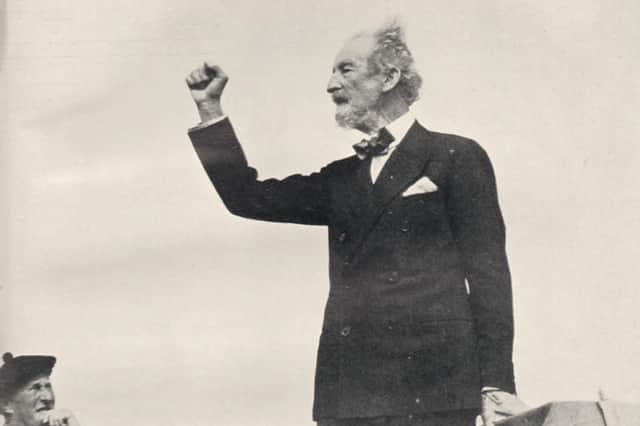Robert Cunninghame Graham played a crucial role in Scottish and UK political history
By alistair grant
Published 15th Oct 2023,

His extraordinary life combined Boys' Own derring-do with a political career that spanned the births of both Labour and the SNP.
Now a special event is to be held to celebrate the life and legacy of Robert Cunninghame Graham, the first MP to ever identify as a socialist.
The inaugural Cunninghame Graham Debate will be held at Glasgow University Union next month, and promises a "challenging" and lively evening.
It will be introduced by James Jauncey, Graham's great-great nephew and biographer, whose recent book attempts to shed light on a "very complicated character".
"He's quite hard to get a handle on," Mr Jauncey told The Scotsman. "I think that's one of the reasons that he's not as well known as he ought to be."
Graham co-founded the Scottish Labour Party in 1888 with Keir Hardie and later became a founding president of the SNP in 1934.
However, it was as a Liberal MP that he represented North West Lanarkshire between 1886 and 1892, during which time he championed progressive causes such as an eight-hour working day and universal suffrage.
He was kicked out of the Commons three times for unparliamentary conduct – he is credited with being the first MP to say the word "damn" in the chamber – and was arrested during a protest in Trafalgar Square, spending six weeks in Pentonville.
But Graham's life also took in remarkable adventures overseas. He travelled in South America as a young man, gaining the nickname Don Roberto, and was later captured by a warlord in the Atlas Mountains and held to ransom for three weeks while attempting to reach the forbidden city of Taroudant in Morocco.
He was friends with some of the greatest literary figures of his day, including Oscar Wilde, George Bernard Shaw and Joseph Conrad, and also wrote extensively himself. Graham's obituary in The Times described him as "the most picturesque Scot of his time"; "an aristocratic socialist and a cowboy dandy".
Mr Jauncey said he was a "hugely significant figure" who should be better known than he is. "My own theory here is that he died just before the Second World War, and in the austerity of the late 40s and 50s I don't think there was room in the national consciousness for someone quite so flamboyant and mercurial and multifaceted," the 74-year-old said.
"Scotland was a pretty dreich place in the 1950s. I mean, I remember it, because I was a child here then. So that's part of it.
"He's been written out of Labour Party history because he ended up as a nationalist. Well, there are two reasons Labour don't celebrate him. One is because he became a nationalist, which they can't tolerate, and secondly because of the difficulty for them of the fact that he was an aristocrat, and a landed one too."
He added: "As far as the SNP are concerned, that's a long time ago now – that's 90 years ago. They probably think of him as a sort of rather eccentric uncle."
Mr Jauncey said he did not think anybody would ever fully understand Graham. "There are lots of question marks around his life and his motives," he said. "He was also very contradictory. He could hold contradictory positions apparently without any trouble."
But he added: "Practically everything that he stood for 100 years ago is as true today as it was when he first voiced it. Universal suffrage, abolition of the House of Lords, all of those things. He was way ahead of his time.
"He's a very complicated character, there's no doubt about it. But I really feel he should be much more widely known than he is."
The Cunninghame Graham Debates, held by Scotland Street Press and the Glasgow University Dialectic Society, will take place on November 7 at 6.30pm, with topics including free speech and Scottish independence. Tickets are free.
No comments:
Post a Comment